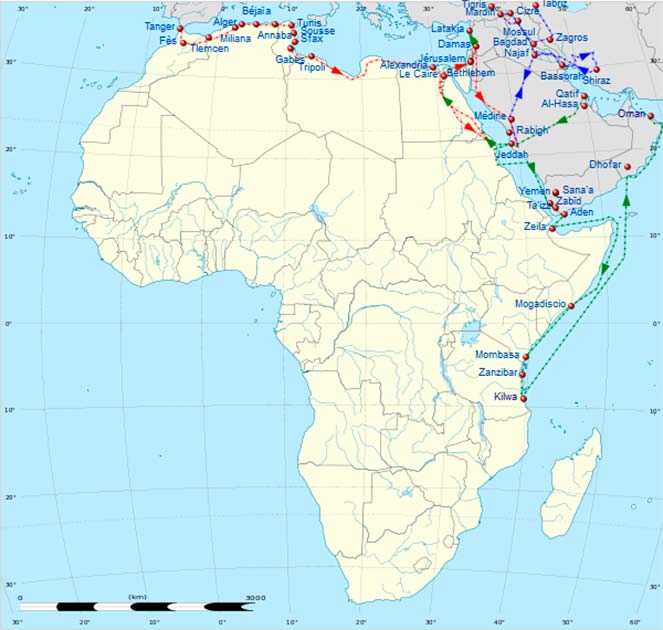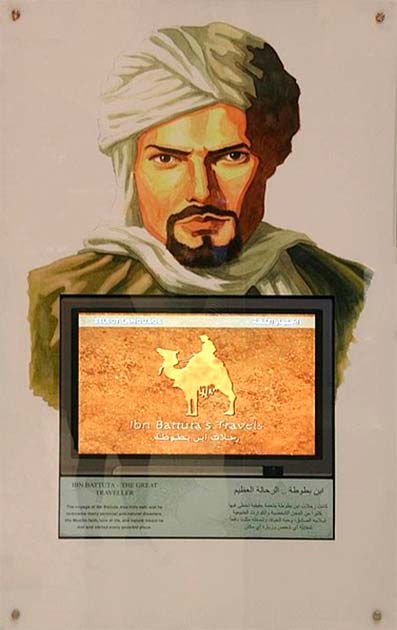Ibn Battuta is widely regarded as one of the greatest explorers in history. But sadly, many people from the West have never heard of him.
This is a shame because his adventures and explorations left an enduring legacy, shaping much of the modern world today. Battuta’s mission spanned multiple continents, numerous decades, and hundreds of thousands of miles and fostered connections that nations still enjoy today.
This is the story of Ibn Battuta, from his humble origins as a law student to becoming one of the great emblems of human exploration. Let’s explore the essence of why he stands as one of history’s most celebrated explorers, illuminating the paths he treads and the impact he made.
History’s Greatest Explorer?
Ibn Battuta, arguably one of the greatest explorers to have ever lived, was born in Tangier, Morocco, during the 14th century AD. He was destined for a life of remarkable exploration, but his early years were relatively uneventful.
He was raised in a family of Islamic scholars, and his youth was marked by the pursuit of knowledge and intellectual discourse. Rather than setting out to be an adventurer, as a young man he chased academia and his parents encouraged him to begin his studies in Islamic law, a path that promised a respectable (and profitable) career in the legal realm.
However, it quickly became clear that a life of academia wasn’t for him, and the fire of adventure burned brightly within. At the tender age of 21, Battuta set out on a transformative journey spanning three decades that would take him across various continents.

Unlike many explorers that came before and after him Battuta wasn’t just driven by a need for adventure and unwavering curiosity. He held a sincere desire to fulfill a religious pilgrimage to Mecca, the sacred obligation of every devout Muslim.
This pilgrimage, the Hajj, was the catalyst that set him on a path of unparalleled exploration. What started as a spiritual endeavor evolved into a lifelong odyssey, driven by his insatiable curiosity about the world’s wonders and his unwavering determination to seek knowledge firsthand.
- Marco Polo: From Venetian Merchant To Mongol Courtier, Or So He Claims
- The Suspicious Death of Meriwether Lewis (Video)
His travels would not only introduce him to diverse cultures, languages, and customs but also grant him a unique perspective on the interconnectedness of humanity.
Battuta’s Legacy
The world has seen its fair share of great explorers, so what makes Ibn Battuta stand out against his peers? For many, what sets him apart isn’t just the vast expanse of his travels, but the profound impact and unique qualities that define his legacy.
Many explorers just set out to explore new lands and chart new territories. Their goal is to see what hasn’t been seen before, often putting their names on the lands they discover. But for Battuta, exploration was about exploring humanity itself, not just the land.
Wherever he went he immersed himself in foreign cultures, languages, and traditions, which allowed him to bridge gaps and foster new connections between disparate societies. With an insatiable thirst for knowledge, he traversed the intricate tapestry of the medieval world, gathering insights into the varied lives of people.
Thankfully, he documented all of his experiences and recorded them in his travelogue “Rihla”. Largely covering his time in India, this text has become an immensely important historical document, giving modern historians and anthropologists a fascinating insight into Medieval India, Islamic rule, and what life was like in general in the region back then.
So many explorers we revere today, figures like Columbus, have complex, often troubling legacies. Often exploration turned to conquest and was marked by a lack of respect for native communities.
But Ibn Battuta was different, his spirit of discovery fueled his quest to comprehend the diverse ways in which societies functioned. His interactions with rulers, scholars, and everyday individuals illuminated his genuine fascination with the human experience.
What makes him one of history’s greatest explorers is how his epic voyages helped encourage cultural exchange and trade between the Islamic world and the other regions he visited. He helped spread Islamic culture and civilization to other parts of the world not through violence but through understanding.
Travels and Discoveries
So, we’ve covered that he was a great explorer, but where exactly did he go? Well, during his travels it’s believed Ibn Battuta covered around 75,000 miles (120,000 km) and managed to visit nigh on every Muslim country in the world. Not bad.
- Kitāb al-Ṭabīkh: Secrets of the Oldest Surviving Arabic Cookbook
- Ernest Shackleton – Surviving Antartica
Due to the initial nature of his journey, Ibn Battuta started out by visiting as many Muslim countries as he could. These adventurers took him to Iraq, Syria, and Persia amongst others.
Venturing beyond the boundaries of his homeland, Ibn Battuta embarked on an awe-inspiring odyssey that spanned continents and cultures. His travels encompassed a remarkable diversity of landscapes, from the bustling markets of North Africa to the exotic realms of the Middle East, Asia, and beyond.

His journey extended across the formidable Sahara Desert, where he traversed trade routes connecting ancient civilizations. He navigated the winding waterways of the Nile and the vibrant bazaars of Damascus, embracing the vibrancy and complexity of the world he encountered.
After covering the Muslim world Battuta set his sight further afield. He traveled to India where he spent several years as an advisor in the court of the Delhi Sultanate. From there he headed to China, East Africa, and the Maldives. His accounts of these journeys offer a vivid tapestry of the cultural, political, and economic dynamics that defined the medieval world.
When we think of explorers, we think of tenacious adventurers who head straight for the edges of the map. People who delve into the unknown, discovering lands not seen by human eyes before. Or in the case of men like Columbus, visiting places other Europeans had never heard of.
But Ibn Battuta was cut from a different cloth. The difficult truth has always been that our most ancient ancestors did a surprisingly good job of covering the globe. For Battuta exploration wasn’t about finding new lands. It was about finding and communicating with new people.
Battuta’s explorations were about making new connections and linking people from all over the world. This is what makes his legacy so powerful.
Through his exploration, he not only charted new territories but also transcended cultural divides, fostering understanding and empathy. Ibn Battuta’s enduring impact lies not only in the lands he visited but in the bridges he built between civilizations.
Top Image: Ibn Battuta in Egypt. Source: Leon Benett / Public Domain.